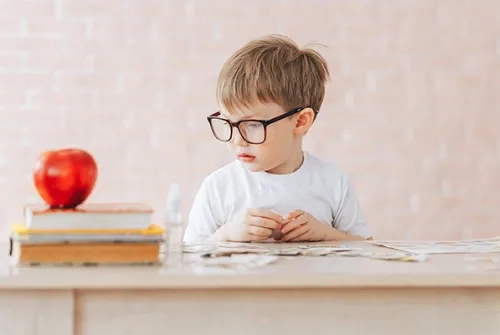Alo Yeditepe
Alo Yeditepe
8 Suggestions for Kids with Focus Problems
Attention deficit is a condition that affects the ability to focus on children. Moreover, this problem can have negative effects on many issues from children's academic success to their social relations. Hence, solutions can provide significant gains for both children and parents. Specialist Clinical Psychologist and Specialist Dietitian Merve Öz gave suggestions to increase the attention span of children, especially in this period.
Do Not Keep Distractions at the Desk
Especially during the online course, the quiet, well-lit, and normal room temperature of the environment will contribute to the focus of the child, Yeditepe University Kosuyolu Hospital Specialist Clinical Psychologist and Dietician Merve Öz: “If possible, it is significant for your child to have a separate room and if s/he has a younger sibling, not to enter this room during class hours. It is important that the desk and working environment are organized and that different course materials that will distract attention are not kept on the desk. Moreover, electronic devices such as tablets and phones should be removed or turned off from the child's work area. Otherwise, these children, who are affected by all kinds of distractions, will be harmed more than beneficial.”
Do Not Allow Your Children To Eat Their Desk
Emphasizing that when there is a snack on the table, the child cannot listen to a lesson efficiently because he/she cannot focus. Clinical Psychologist and Dietician Merve Öz stated, "The food in front of you reduces the efficiency of the lesson, making it difficult to focus. There should be no food in the study room, especially during online lessons. In addition, it is necessary to encourage children to consume water because water consumption increases focus and enables the brain to work quickly. However, the habit of drinking water in children is very difficult and children usually cannot drink the amount of water they need to drink daily. Therefore, having water on the table or near the child's work environment helps to get used to it.''
Skip the Rope at Home, Jump on the Trampoline
Explaining that children cannot focus on the lesson after spending 10 minutes of recess with their phones or watching TV, Clinical Psychologist, and Dietician Merve Öz said, “When they enter the class, their minds will naturally remain in the game or series. Instead, jumping rope, jumping on the trampoline, walking in the house, doing small exercises will both help them to throw away their energy and make it easier for them to focus on the lesson.”
Play Brain Teasers Together
“Doing regular brain exercises, solving puzzles, and playing intelligence games have a very powerful concentration-enhancing effect.” Clinical Psychologist and Dietician Merve Öz stated children should be directed to activities such as playing chess, doing puzzles, solving puzzles, and playing water tissue in the time left over from their homework and online lessons.
“Having a good time with the families of children who are distant from their friends benefits their emotional and social development. Box games such as bingo, Jenga, scrabble, and chess will both improve children's attention levels, hand skills, and communication skills and help them have a good time as a family."
Make Sure They Have Breakfast
Especially with the online lesson system, some children can resist eating breakfast. However, children need to have breakfast before starting their online lessons in order to concentrate on the lesson. Therefore, breakfast must be served. In addition, taking 3 snacks in addition to the main meals during the day is very important both in terms of concentration and general health.
Do Not Change Your Sleep Schedule Including the Weekend
Sleep is essential not only for our body but also for our brain to rest. Clinical Psychologist and Dietician Merve Öz: “Adequate sleep is essential for physical and cognitive development. Long-term sleep disorders in children can lead to problems in cognitive functioning such as attention, learning, and memory. Therefore, loud noises that will prevent children from sleeping should be avoided. Children's sleeping hours should be determined for weekdays and weekends and should not go beyond the determined hours."
Create a Studying Environment Together!
Proposing the creation of a studying plan with children, Specialist Clinical Psychologist, and Dietician Merve Öz added that appreciating the positive behaviors of the child in this context will increase the frequency of positive behaviors.
Allow Them to Get Together With Their Friends Even If It Is Online
“Let your children have video conversations, even if they cannot meet their friends face-to-face. In addition, children who long for their friends may not be able to focus enough on their lessons while trying to chat with their friends in lessons or because they focus more on their friends than their teachers.” Clinical Psychologist and Dietician Merve Öz underlined that children who spend time with their friends outside the classroom can focus on the lesson more easily.
Press Coverage: sabah | akittv | aksam | gazetevatan | milliyet | mynet | cnnturk | haberler | star
About
Faculty and Year of Graduation:
Yeditepe University Faculty of Arts and Sciences, Department of Psychology and Faculty of Health Sciences, Department of Nutrition and Dietetics, 2016
”
See Also
- What is Vitamin A? What are the benefits of Vitamin A?
- What is Selenium? What Does It Do? What are the Benefits?
- Does the Sweltering Heat Affect Our Mental Health?
- What is Vitamin E?
- What is Coenzyme Q₁₀? What are the Benefits of Coenzyme Q₁₀?
- What is Vitamin B12? What are the Symptoms of B12 Deficiency?
- What is Mythomania (Pathological Lying Disorder)? What Causes Mythomania?
- What is Emotional Hunger? How Does It Arise?
- Benefits of Spices
- What Does Narcissist Mean? Narcissistic Personality Disorder
- At What Age Should Children Start Using Social Media?
- What is the Ideal Age for Marriage?
- Special Nutrition Recommendations for the Eid
- The True Face of the Protein Myth
- What Are the Benefits of Beets?
- Suggestions to Get Rid of the Menopause Belly
- "Is the Watermelon Diet Healthy?
- Ways to Boost Mental Resilience
- Frequently Asked Questions about Detox
- Boost Your Immunity Naturally
- Which Foods Should be Consumed Together?
- How Do You Approach a Child Who Is Reluctant to Go to School?
- Stop Blaming Yourself
- The Concern of Being a ‘’Good Mother’’ in Pregnancy
- It is Possible to Lose Weight by Dominating Your Brain
- Mom, Can I Sleep With You?
- 9 Points to Be Considered for a Healthy Ramadan Month!
- Emotional Eating May Be the Cause of Your Weight Gain
- The Healthiest Summer Fruits
- Shining Star of the Tables: Probiotics
- The Problem may be the Lack of Self-Confidence!
- Ways to Deal with Quarantine Weight
- Burnout Syndrome at Work Gains Weight
- Children Should Be Away From Fast Food Toy
- Children's Eating While Studying Prepares the Ground for Obesity
- Permeable Bowel Syndrome Can Prepare the Ground for Diseases
- Suggestions to Prevent Children from Gaining Weight While Still
- 8 Suggestions to Keep the Immune System Strong in Ramadan
- It is also Possible to Lose Weight During the Holidays!
- Immune Enhancing Nutrients
- Is Co-Sleeping With the Child Right?
- Healthy New Year's Eve Table Suggestions
- Do not take unneeded calories to your body
- Suggestions to Increase Metabolic Rate…
- Nutrition Recommendations Before the Exam
- How to Feed Children in Summer?
- Is There a Nutritional Difference Between Sports to Increase BMI and Sports to Lose Weight?
- What Should You Do to Avoid Gaining Weight for the Holidays? Do Not Be a Victim of the Buffet
- Cancer and Nutrition
- Nutrition and Diet
- Healthy Diet
- Elderly Care
- Alkaline Nutrition
- 9 Tips to Prevent You from Gaining Weight While at Home
- 9 Suggestions to Fix Childrens Deteriorated Eating Habits
- Fibromyalgia May Be the Cause of Persistent Pain
- What to do from Iftar to Sahur for a Healthy Ramadan
Alo Yeditepe



